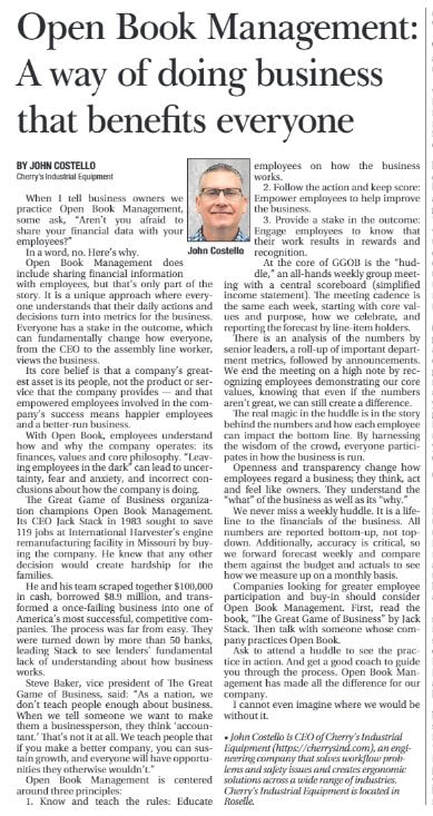Open Book Management (OBM) is a management approach that involves sharing financial and operational information with employees at various levels within an organization. This transparency aims to help employees understand the company's financial health, objectives, and performance metrics. Here are some benefits of implementing Open Book Management:
- Increased Employee Engagement: OBM fosters a sense of ownership and responsibility among employees since they can see how their work directly impacts the company's financial outcomes. This heightened engagement can lead to improved job satisfaction and motivation.
- Enhanced Financial Literacy: Open Book Management helps employees develop a better understanding of financial concepts and how the organization generates revenue and profits. This knowledge can translate into more informed decision-making and better overall business acumen.
- Alignment with Organizational Goals: When employees have access to financial information and understand the company's objectives, they are better able to align their efforts with those goals. This can lead to more focused and effective collaboration across departments.
- Innovative Ideas and Problem-Solving: Open Book Management encourages employees to think creatively about improving the company's financial performance. Since they have a clearer picture of the challenges and opportunities, they can contribute innovative solutions and ideas.
- Cost-Saving Ideas: Employees who are aware of the company's financial situation may be more proactive in identifying areas where costs can be reduced or efficiencies can be gained. This can lead to cost-saving initiatives that positively impact the bottom line.
- Transparency and Trust: Sharing financial information openly demonstrates trust in employees and promotes a culture of transparency. This can enhance trust between management and staff and reduce potential feelings of secrecy or distrust.
- Empowerment and Autonomy: When employees have access to relevant financial data, they can make informed decisions without waiting for top-down directives. This empowerment can lead to faster problem-solving and decision-making at all levels of the organization.
- Performance Accountability: OBM provides a clear way to measure performance against key financial metrics. Employees can see the direct impact of their efforts on these metrics, which can encourage accountability and a sense of responsibility for results.
- Crisis Management: In times of financial challenges or uncertainty, employees who understand the company's financial situation are better equipped to contribute to solutions and make informed choices to navigate the crisis effectively.
- Improved Communication: OBM promotes open dialogue and communication among different levels of the organization. Teams can discuss financial data and performance openly, fostering better collaboration and sharing of insights.
- Skill Development: As employees become more familiar with financial information, they develop valuable skills in interpreting financial statements, understanding market dynamics, and assessing business viability.
- Attraction and Retention of Talent: A transparent and engaging work environment, such as that fostered by Open Book Management, can attract top talent and contribute to employee retention, as employees feel valued and part of something larger.
He wrote an article in the Daily Herald Sunday Business Section on Sunday, August 20, 2023 about how he uses the concept and the benefits:
https://www.dailyherald.com/business/20230820/open-book-management-a-way-of-doing-business-that-benefits-everyone



 RSS Feed
RSS Feed


